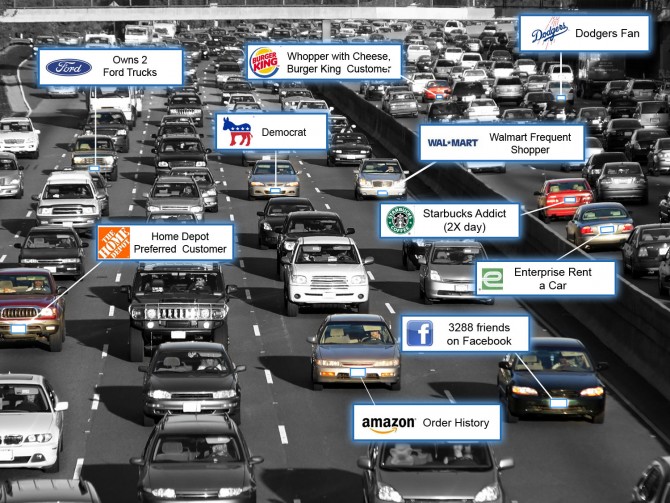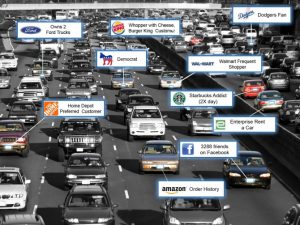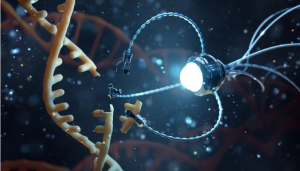14 Billion Police License Plate Database, Knows Where You Are in Real-Time: Police to “Grid” Entire Neighborhoods
6 min read
Forget everything you have ever heard about police license plate readers and public safety, because it is all a lie.
Three major Automatic License Plate Reader (ALPR) companies have created a mind-boggling database of 14 billion license plates that allows law enforcement to track anyone in real-time.
The Digital Recognition Network (DRN) has a database of over 8 billion license plates and boasts about sending customers (law enforcement) live vehicle location alerts.
“If you think there is nothing you can do to automatically detect vehicles, think again. DRN’s Live Alerts, part of the DRNsights for Insurance solution, uses vehicle location data gathered from over 8 billion nationwide sightings plus the 160,000 million gathered each month, to provide alerts when vehicles are detected.”
Vigilant Solutions webpage has a database of over 5 billion license plates and collects a little less than DRN daily.
“We are the only ALPR provider that can offer over 5 billion nationwide detections and over 150 million more added monthly.”
Vigilant Solutions also offers customers (law enforcement) a “Mobile Hit Hunter” or hotlist feature, that tracks vehicles in real-time.
ICE uses ALPR’s and local law enforcement to track people in real-time
According to a recent NY Times article, ICE with help from law enforcement uses ALPR’s to track “hotlisted” people or people of interest in real-time.
“The agency relies on state D.M.V. databases and information products like CLEAR. It shows how the Real ID Act of 2005, along with funding from the DHS and help from umbrella groups like the American Association of Motor Vehicle Administrators, has laid the groundwork for real-time, real-world monitoring of American residents. ”
ICE and police rely on Vigilant Solutions ALPR’s to send them immediate iPhone alerts whenever a [hotlisted] target is scanned by a camera in their network.
“Perhaps the days the officers sat at the side of the road and watched traffic pass, perhaps the days they cruised parking lots outside restaurants or seafood processors or apartment buildings, perhaps the days they saw drivers they decided looked foreign, the searches followed the telltale pattern of a fishing expedition: plate, plate, plate, plate, plate, plate, plate, plate.”
As I reported last month, Rekor Systems has a massive 30 state real-time license plate database that collects 150 million license plates every month.
But Rekor Systems does something the other ALPR companies do not. They can send law enforcement detailed descriptions of any vehicle in real-time.
“Our software upgrades any IP, traffic, or surveillance camera into a vehicle recognition solution that can be used for realtime alerting of license plates. Not only does the software read a license plate number, but it also provides vehicle type, make, and color, something the competitors cannot do.”
Rekor Systems, which is also being used by 69 countries, likely has a database of billions of people’s license plates.
Combined, these three companies alone have easily collected more than 14 billion license plates.
But why stop there? There must be other ALPR companies adding to this massive police license plate database, right?
Another ALPR company called, PlateSmart Technologies sends all their license plate data to Fusion Centers.
“Our goal is to create a collaborative network for secure data sharing for fusion centers, law enforcement, and government while adhering to ALPR industry best practices and provide a means of transparency.”
And Genetec’s “AutoVU” automatic license plate readers lets customers (law enforcement) create secret hotlists.
“AutoVu lets you manage all of your hotlists from one system and decide whether to share plate reads or hits beyond your organizational boundaries. Advanced features, including Federation and covert hotlists, empower your organization to enlist the aid of other AutoVu systems without compromising the safety or privacy of their staff and clients.” (To learn more about hotlists, click here.)
Flock Safety, an ALPR company that makes its money by turning neighborhoods into a virtual police state, wants license plate readers on every street.
Recently residents of Jersey Village, Texas put “a camera on every street to create a virtual gate” that resulted in Flock Safety catching two vehicles on the NCIC Hot List.
There are many more smaller ALPR companies that contribute to a much larger police license plate database in the U.S., but hopefully you get the idea. (To find more APLR companies click here & here.)
Unless something is done to stop tracking everyone’s license plates soon, we can expect the police license plate database to grow to 20 BILLION in a few years.
What will it take for Americans to wake up and realize that license plate tracking is not about public safety? It is about creating a detailed picture of everyone’s travels.
Police Use License Plate Readers To “Grid” Entire Neighborhoods
Law enforcement is using Automatic License Plate Readers (ALPR) to “grid” entire neighborhoods.
What does gridding mean?
The Arizona Mirror describes gridding as,
“Part of the training for the ALPR systems, Chandler police officers are taught to “grid” neighborhoods during their downtime – systematically driving up and down every street in an area, indiscriminately scooping up information on vehicles.”
Gridding entire neighborhoods allows Big Brother to form a detailed and highly accurate pattern of everyone’s driving habits day and night, 24/7.
Police use “grids” to gather intel & create mini-surveillance zones
Police gridding allows Big Brother to create secret mini-surveillance zones of entire neighborhoods.
American police “gathering intel” on the public is a mirror-image of China’s “People’s Armed Police” or the United Kingdom’s “Metropolitan Police” who spy on their citizens for the government.
There is no defense for police gathering intel on innocent people, but that does not stop them from making up absurd excuses to justify it.
Chandler Police Department Commander Ed Upshaw compares police “gridding” to a YouTuber who records someone in public.
“If your vehicle is parked in a public place or visible from a publicly accessible place, it can be recorded by anyone. Is there a reason a YouTuber can record but police cannot?”
Comparing systematic police surveillance to a YouTuber recording people in public is like comparing apples to oranges.
Another bogus excuse by Big Brother was reinforced by Federal Massachusetts Judge Robert Rufo, who ruled that police ALPR’s on bridges “was legal because the cameras only track movements on and off the Cape, and not movements across the state.”
What Rufo failed to mention is the only way for motorists to access the Cape is by travelling over those bridges. It might not be mass surveillance of motorists statewide but it is certainly “Mass.” surveillance of Cape Cod motorists. (pun intended.)
Fast-food drive-thrus are also planning on using ALPRS and facial recognition to identify drivers and passengers according to an article in Zero Hedge.
According to the article, customers can sign up to be spied on using a company’s loyalty rewards program much like Hertz Global Holdings. Fast food restaurants will use 5Thru.com‘s ALPRS to identify customers.
Is there any way to opt out of being tracked once you drive onto their property? What do you think?
Big Brother’s appetite for mass surveillance is appalling and it effects everyone’s ability to travel freely.
Jared Keenan, Criminal Justice Staff Attorney at the ACLU of Arizona warned that “police could grid low-income or minority neighborhoods more often, which could lead to over-policing of those neighborhoods — even if there are just as many crimes in rich, white areas.”
There is simply no excuse to “grid” entire neighborhoods or train police to “gather intel” on Americans without a warrant. Has law enforcement become a three letter word? Have they become DHS, FBI, CIA, DEA or ICE pawns?
Source: http://humansarefree.com/2019/10/14-billion-police-license-plate.html












Yes I agree with everything here …
Only that $8 billion is an enormous amount for something so simple.
So – how much of the $8billion will be syphoned off to slip away into private pockets ??
We are taklin about SOFTWARE being purchased & loaded up & set in play on a computer system that already exists …
Hey !!